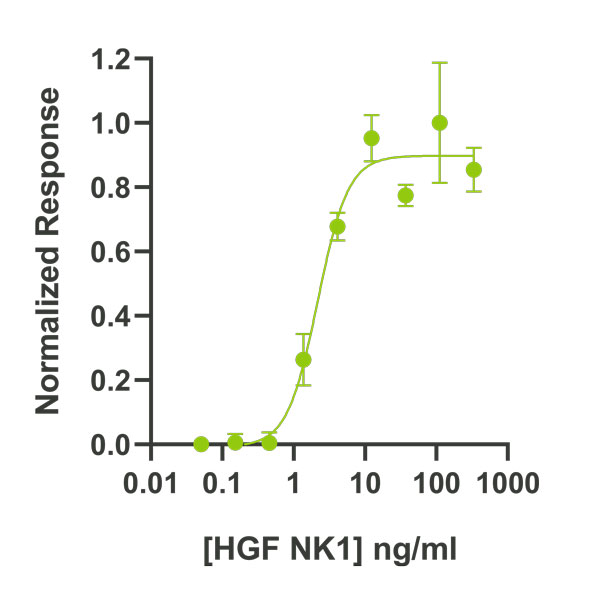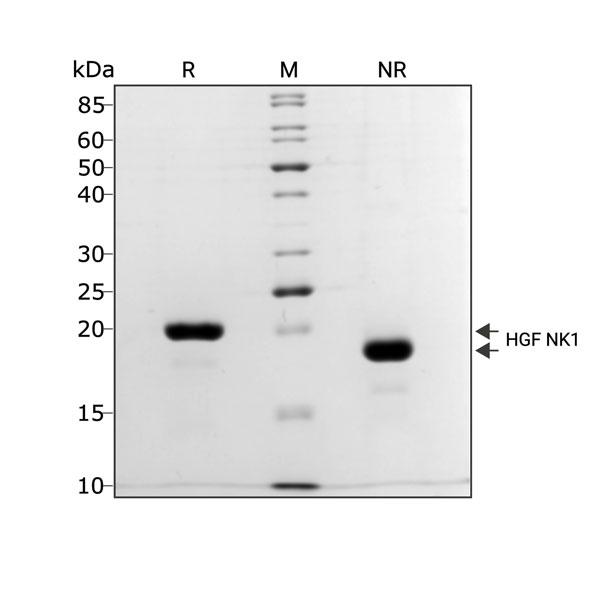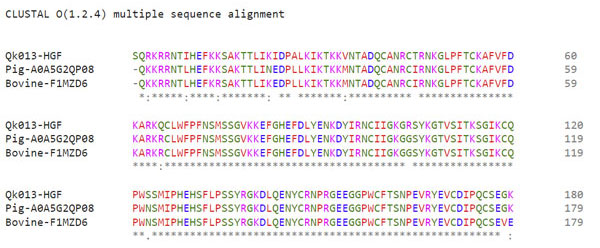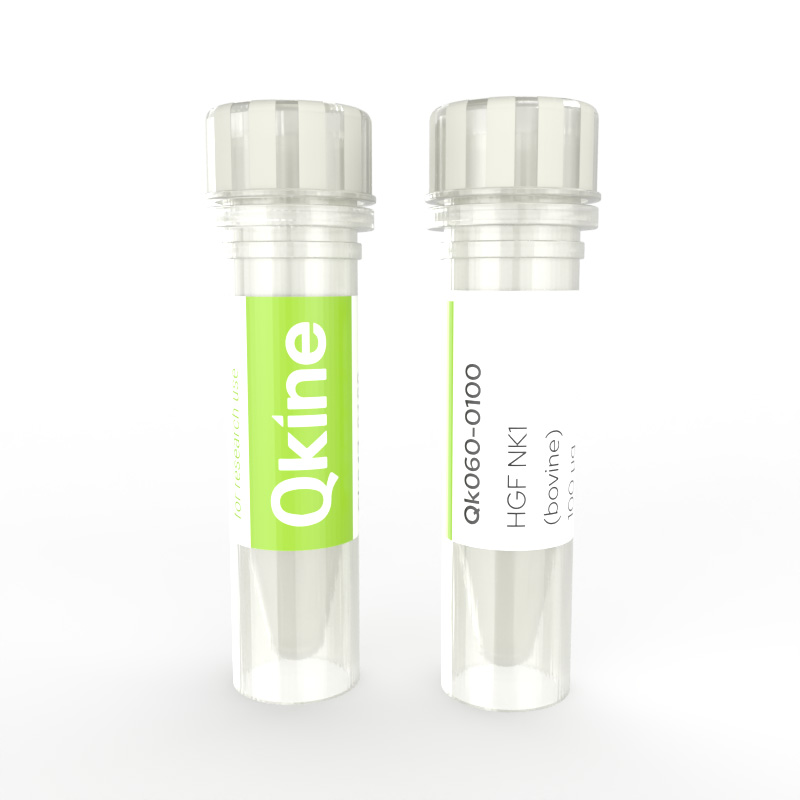Currency
Recombinant bovine HGF (NK1) protein (Qk060)
Recombinant bovine HGF (NK1) protein is a potent, high-purity NK1 isoform of bovine hepatocyte growth factor (HGF). Bovine HGF differs from human HGF at several key amino acid residues that are predicted to affect bioactivity and receptor binding. Use of species-specific HGF growth factor will facilitate media optimization for cellular agriculture (cultivated meat) and veterinary applications. Also available is Qk061 Porcine HGF (NK1). The highly scalable animal-free manufacture and enhanced bioactivity make this suitable for chemically-defined media and reproducible scale-up.
20kDa naturally occurring isoform of HGF, animal-free and carrier-protein free.
Orders are typically shipped same or next day (except Friday).
Easy world-wide ordering, direct or through our distributors.
1000µg will be despatched as 2 x 500µg
Fast and free shipping.
Buy online with secure credit card or purchase order.
For any questions, please email orders@qkine.com
Summary
High purity recombinant bovine HGF protein (Uniprot: F1MZD6 )
>98%, by SDS-PAGE quantitative densitometry
20 kDa
Expressed in E. coli
Animal origin-free (AOF) and carrier protein-free.
Manufactured in our Cambridge, UK laboratories
Lyophilized from acetonitrile, TFA
Resuspend in 10mM HCl at >100 µg/ml (provided with protein and free of charge), prepare single use aliquots, add carrier protein if desired and store frozen at -20°C or -80°C
Featured applications
Differentiation of iPSCs to hepatocyte-like cells
iPSC and primary cell differentiation to muscle
Cellular agriculture and cultivated meat cell culture media optimization
Bovine
Bioactivity

HGF NK1 activity is determined using the Promega serum response element luciferase reporter assay (*) in HEK293T cells. EC50 = 2.0 ng/ml (96 pM).
Cells are treated in triplicate with a serial dilution of HGF NK1 for 3 hours. Firefly luciferase activity is measured and normalized to the control Renilla luciferase activity. Data from Qk060 lot #104408. Please note: protein activity has been determined in a standardized assay using human cells.
*Promega pGL4.33[luc2P/SRE/Hygro] #E1340
Purity

Recombinant bovine HGF protein (Qk060) migrates as a single band at 18 kDa in non-reducing (NR) conditions and 20 kDa upon reduction (R). Purified recombinant protein (3 µg) was resolved using 15% w/v SDS-PAGE in reduced (+β-mercaptothanol, R) and non-reduced (NR) conditions and stained with Coomassie Brilliant Blue R250. Data from Qk060 batch #104408.
Further quality assays
Mass spectrometry: single species with expected mass
Analytical reversed-phase: single sharp peak
Endotoxin: <0.005 EU/μg protein (below level of detection)
Recovery from stock vial: >95%
We are a company founded and run by scientists to provide a service and support innovation in stem cell biology and regenerative medicine. All our products are exceptionally high purity, with complete characterisation and bioactivity analysis on every lot.
Protein background
Hepatocyte growth factor (HGF) regulates cell growth, cell motility, and morphogenesis and plays a central role in angiogenesis, tumorogenesis, and tissue regeneration. HGF binds and activates the receptor tyrosine kinase, c-Met, activating PI3K/AKT, FAK, JNK, and ERK1/2 signaling [1].
HGF is secreted as a single inactive polypeptide and is cleaved by serine proteases into a 62-kDa heavy-chain and 32-36-kDa light-chain. A disulfide bond between the heavy and light chains produces the active, heterodimeric molecule [2]. Alternative splicing of HGF produces multiple transcript variants encoding different isoforms. The NK1 isoform is the smallest naturally occurring splice variant, comprising the N-terminus and first kringle domain [3].
Bovine HGF has been extensively studied for its role in muscle development. HGF is known to be involved in the proliferation of satellite cells, which are key components of skeletal muscle growth. HGF has also been observed to enhance the formation of myoblasts and induce cell fusion, leading to an increase in muscle mass and strength. Furthermore, bovine HGF increases myofibrillar protein synthesis and can help restore the normal structure of muscles damaged by injury or disease. HGF may also play a role in regulating inflammatory responses during tissue repair. In addition to its effects on skeletal muscle, HGF has also been shown to have diverse activity in other tissues such as liver, brain and kidney.
The use of HGF in cultivated meat production and cell culture media optimization is an emerging field. HGF has been shown to increase the efficiency of cell proliferation and differentiation, while also improving adhesion properties during the scale-up process. HGF has also been observed to improve cell attachment and survival in various cell types such as skeletal muscle cells and cardiomyocytes. In addition, HGF supplementation in optimized or serum-free media formulation has been effective for optimizing cell culture outcomes for several cell types in basic research studies or biopharmaceutical applications.
Human HGF and bovine HGF proteins share many similarities in terms of structure and function. However, there are certain differences between the two proteins. Bovine HGF has a much lower molecular weight than its human counterpart, as well as different biochemical properties such as higher solubility and stability. Furthermore, the bovine HGF gene contains a longer leader peptide sequence that increases its translational efficiency compared to the human HGF gene. In addition, the binding affinity of bovine HGF for tyrosine kinase receptors is significantly higher than that of human HGF, indicating that it may be more potent in mediating biological effects than human HGF.
Multiple isoforms of bovine HGF have been detected, thought to have a role in a range of biological activities and cellular responses. For example, some HGF isoforms have been observed to stimulate cell proliferation while others modulate inflammation or enhance muscle growth and repair. Less is known about the functions of HGF isoforms in bovine systems than human development. The variety of HGF isoforms present in bovine HGF increases its potential to regulate a wide range of physiological processes and may contribute to its efficacy as an ingredient for cultured meat production.
Qkine HGF (NK1) is produced in an animal-free microbial system that is compatible with production at scale. We are expanding our range of innovative growth factors for cellular agriculture and cultivated meat media development to support advances in the field, please reach out to cellag@qkine.com to discuss collaboration opportunities.
Species-specificity of HGF is predicted to impact bioactivity
Bovine HGF differs from human HGF at several key amino acid residues that are predicted to affect bioactivity and receptor binding. Clustal Alignment showing sequence variation between HGF NK1 from different species. Note the lack of structural conservation at key residues, which is predicted to impact receptor binding and activation.

Our products are for research use only and not for diagnostic or therapeutic use. Products are not for resale.




What others are saying
There are no contributions yet.